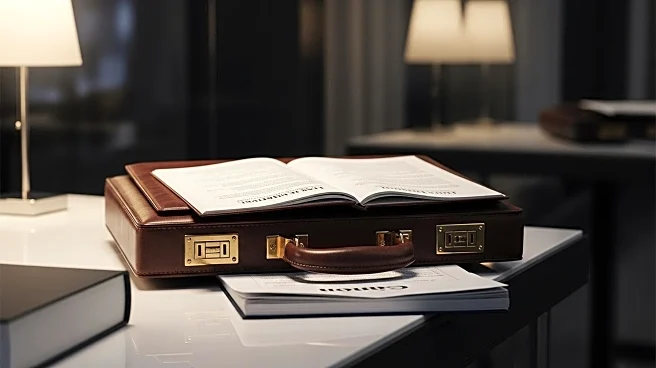What's Happening?
Gene Pressman, an heir to the Barneys luxury empire, was served with a tax-fraud lawsuit during a book signing event in New York City. The lawsuit, filed by his estranged brother Bob Pressman, accuses Gene, his two sisters, and their late mother, Phyllis, of orchestrating a tax fraud scheme that allegedly cheated New York state out of $20 million. The incident occurred at Rizzoli Bookstore, where Gene was promoting his memoir, 'They All Came to Barneys: A Personal History of the World’s Greatest Store.' A process server handed Gene the lawsuit instead of a book to sign, leading to a heated reaction from Gene. The lawsuit claims the Pressman family falsely declared Phyllis Pressman's residence to avoid estate taxes, potentially making them liable for up to $50 million in back taxes and penalties.
Why It's Important?
This lawsuit highlights significant legal and financial implications for the Pressman family, potentially affecting their reputation and financial standing. The case underscores the importance of accurate tax reporting and the consequences of alleged tax evasion. If the allegations are proven, the Pressman family could face substantial financial penalties, impacting their wealth and legacy. Additionally, the lawsuit could influence public perception of the Barneys brand, which has been associated with luxury and high fashion. The case also illustrates the complexities of family dynamics in business, as internal disputes can lead to public legal battles.
What's Next?
Gene Pressman has 20 days to respond to the lawsuit, which could lead to a prolonged legal battle. The case may involve further investigations into the family's financial practices and estate management. Legal experts and tax authorities will likely scrutinize the evidence presented, potentially leading to a trial. The outcome could set a precedent for similar cases involving estate tax evasion. Stakeholders, including the Pressman family and their legal teams, will need to prepare for possible court proceedings and public scrutiny.
Beyond the Headlines
The lawsuit raises ethical questions about tax avoidance and the responsibilities of wealthy individuals in contributing to state revenues. It also highlights the potential for family disputes to escalate into public legal challenges, affecting personal relationships and business reputations. The case may prompt discussions on the legal frameworks governing estate taxes and the measures needed to prevent tax evasion.








